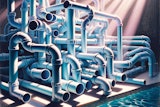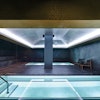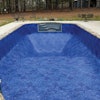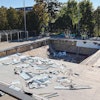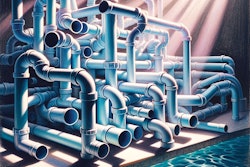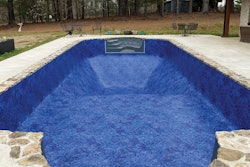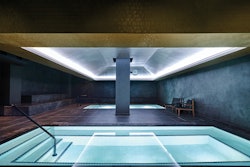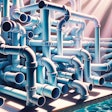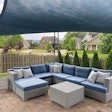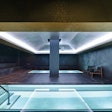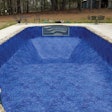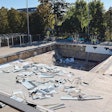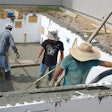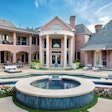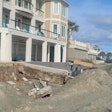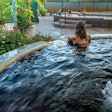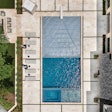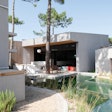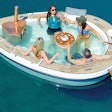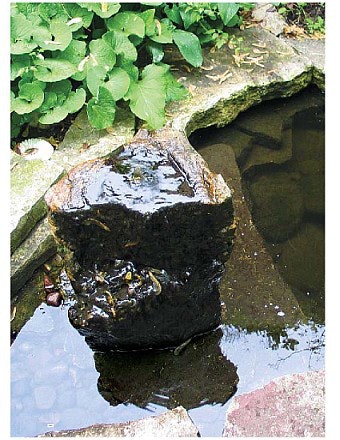
The clients have disposable income. They are spending more time living in their backyards and want to make it even more enjoyable by adding water. They expect the planning and design process to be collaborative and they want their contractor to really listen to what they want — and what they want may or may not be realistic.
They probably don't want to get too involved in the details of pumps and filters and other equipment, but they want everything to operate smoothly.
Sound like your typical high-end pool clients? One more detail: They want to make sure the installation will support their champion Tancho Kohaku koi along with a selection of native marginal plants.
Huh?
These clients are in the market for a high-end pond. With the well documented consumer focus on home and on the backyard as an additional living space, ponds and water gardens are gaining popularity with the same types of homeowners who might consider adding a pool.
Ponds and pools have a lot of similarities — enough, in fact, that it's not a stretch for most good pool builders to do pond installations and service. But there are some crucial differences. Understanding the differences and leveraging the skills you already have as a pool builder can result in a satisfying specialty service to offer your clients.
People Skills
The most successful water garden projects are collaborations between the client and the homeowner. But one of the first things contractors may find is that many clients don't actually know what they want. So, just like when they're building a pool, builders must be able to educate their customers and help them arrive at a workable design that will satisfy them for years to come.
John Rottersman, vice president of the Midwest Pond & Koi Society, says that many of the people he sees as a water-gardening teacher and consultant are enthusiastic but uninitiated. "They know that they want a water feature in their yard. They know that they want to have the sound of water. They know that they want to have fish. They know that they want to put in plants and integrate it into the landscaping," he says. "But how to maintain it and what they're getting into — they usually aren't that savvy.
"So much of it is just a dialogue of getting to know your customer. If the customer's true intent is to have something pretty to look at, but not to spend a lot of time, that person will need to have someone maintain the pond for them. And that's perfectly fine, but the contractor needs to make sure that the client knows there's added expense there."
Landscape architect Jon Adams-Kollitz, whose firm, Formecology, installs water features and water gardens, agrees. "The first and foremost thing that I make sure of is that they really want a water feature and the maintenance that it entails; I think it's important for the homeowner to make sure that they really want that as a part of their landscape," he says.
Bob Passavoy, president of the Midwest Pond & Koi Society, says other enthusiasts look for the same qualities in a pond builder as they would look for in a pool builder: "The best ones will come and sit down, tell you what they can do, listen to what you want, tell you why you can't have it and then go back and forth until you come to something that you want but that is also practical and buildable."
Satisfied clients bear the idea out. Ann Rifenberg and Barbara Zahn appreciate the collaborative way that Adams-Kollitz worked on their Verona, Wis., property. "He was able to envision and carry out our dreams for the water and the landscaping," says Rifenberg. "It became more than what we expected." While she wanted to be very involved in the design process, Rifenberg wanted a contractor who she could trust to make the decisions about technical things like pumps and filters. "I trust Jon; I only want to understand enough to maintain the installation," she says.
Jane Kinney, another Formecology client, also knew what she wanted from the design, but preferred to leave the mechanical details of her pond in Madison, Wis., to the professional. "He is a very fastidious worker," she says of Adams-Kollitz. "I'm sure it's going to last for a long time."
On the other hand, there are serious hobbyists who will know a lot about what they want in a pond, right down to the maker of the motor in the pump. "That's someone who's probably already been through the two-water-lilies-in-a-washtub stage, then dug one of his own and had it be a disaster," says Passavoy. "So if they're going in high-end, they are reasonably knowledgeable and willing to learn more. And the more knowledgeable the contractor is about water gardening and aquaculture, the easier that exchange becomes."
The Pond Difference
The biggest difference between a pond and a pool is the filtration and sanitation. This is a distinction builders will need to master before they build any ponds. They'll also need to be able to educate or converse with their clients on the topic.
"The 180-degree difference is that the pool people are putting chlorine into the water and the pond people are trying to take it out," says Rottersman. "Chlorine will kill the filtration system. It will kill the fish and the plants. Biological filtration is something pool builders will need to learn about." Biological filtration is the natural process by which bacteria break down the ammonia generated by fish and plant waste. A biological filter provides a site for the bacteria to colonize and do their work.
Passavoy emphasizes that what's safe for humans is not safe for fish and plants. "It is essentially a living ecology. If you sterilize that water, you don't have a pond," he says.
Something Fishy?
Once you're clear on the differences between swimming pools and ponds, the next step is to understand the different types of ponds and establish which type your clients want. One way to look at it is as a spectrum; on one end, ponds with plants as the stars; on the other, ponds with fish as the center of attraction. A pond that's ideal for koi is not ideal for many types of plants. And vice versa. "The contractor has to ask, 'What do you want to do with this pond and what kind of critters are you going to grow.?'" advises Passavoy.
"Many of our members are best defined as water gardeners," says Passavoy of the MPKS membership.
"They are interested in putting together something that is very natural looking with a minimum of aquatic wildlife, but with a lot of planting. At the other end of the spectrum are the rabidly competitive koi fanciers who bring their fish to our show every year and they're looking for maximum gallonage, absolutely peak filtration, as much depth as they can get and conditions that favor the growth of large and beautiful fish."
The two most important aspects of a koi pond are robust filtration and depth. Koi produce a huge amount of waste, which must be broken down by a biological filter. Additionally, koi do best in a deep pond — at least 4 feet deep, according to breeders — and deeper if possible.
"So what you're looking for is a mass of water that's going to hold its temperature, its alkalinity, its pH and its water quality as naturally and stably as possible. The larger the volume of water you have, the easier the pond is to maintain. The deeper the pond, the more stable the temperature," says Passavoy. At the other extreme, water gardeners need shallow ledges and nooks and crannies to provide optimum growing spaces for water plants and marginal plants. Considerations for the enthusiastic water gardener's pond include site exposure to sun and prevailing winds. Additional questions to ask include: Will still water or running water best suit the plant varieties the gardener wants to grow. Will the plants grow in submerged pots, or will there need to be a substrate for their roots.
Somewhere in the middle are setups for clients who primarily want the beauty of water. "There is something that is hard-wired into each of us that responds instinctively to the sound of natural running water," says Passavoy. Bob Reiser, who owns The Frog Bog in Verona, Wis., has more than 20 years' experience in the pond business and has seen just about every type of pond — and pond enthusiast — imaginable. "Some people really want the sound and the look of the white water crashing off rocks," he says. "If you don't want fish, we can even put in a pond without a filter in it. It's a simple pond to install and easy to maintain."
Pond Protection
Responsible pool builders know all about building codes and permits, and the safety concerns that attach to pools. Just as codes for pools vary from municipality to municipality, so do requirements for ponds. In fact, builders may find them even more frustrating than those for pools.
Passavoy says his town places the same restrictions, ordinances and requirements on ponds as they do for swimming pools. "The break point for depth seems to be 24 inches. Anything deeper stops being a water feature — and essentially unregulated — and starts being a swimming pool," he says. So he has a 4-foot fence completely surrounding his pond, automatic closing gates, automatic latches and no overhead wires.
"Professional installers need to really make sure that what they're doing conforms to code," says Rottersman.
Free Advice
To learn more about ponds and ponders, the experts have several suggestions. As with pools, seeing as many different examples as possible will add to your idea archive, so visit ponds in your area. "With us, all you have to do is lean over our back fence, and say 'Ooo! Pretty! Shiny!Õ says Passavoy. "You'll be invited in, you'll be handed an umbrella drink, and you'll get the nickel tour. We're always happy to show off our ponds."
Says Reiser, "I have gone around the country talking to people on pond tours. The best question I've asked is 'What didn't work for you.?'"
Rottersman took advantage of others' mistakes, too. "We probably looked at 80 to 100 ponds and always asked the owner, 'What would you do differently.?'"
Another way to learn about water gardening and perhaps develop clients is to become involved in a local pond and water garden club. Pond clubs abound throughout the United States and Canada. A quick Internet search will locate the ones closest to you.
Pool builders already have most of the skills and business infrastructure needed to add ponds and water gardens to their repertoires. They already have clients who fit the profile of a typical water-garden enthusiast. With a little continuing education, pool professionals can offer an even wider variety of recreational water to their clients.
Better Together
Formecology clients are always part of the conversation
Like any good designer — whether landscape, pool or interior — landscape architect Jon Adams-Kollitz approaches the planning and design process as a collaboration between himself and his client.
"The first thing that I make sure of is that they really want a water feature," says the principal of Formecology, a Madison, Wis., firm. "When someone asks me about a water feature, I think they already have something in mind, but I try to bring up some other things that they might not have thought about like the sound, the ability to attract wildlife, the constraints of the site with particular emphasis on topography," AdamsKollitz says. "I'm always asking, 'Where is the window that you might open on a May evening?' or 'Are you interested in attracting birds?'"
Adams-Kollitz finds that clients often don't realize all that a water garden entails, so he is realistic about water in the landscape. "I really try to talk to people about what they'd get out of it and whether or not they want the potential maintenance costs." But he's also enthusiastic: "I don't know of anything that achieves the kind of holistic level of satisfaction that water provides. It's mesmerizing for most people."
Jane Kinney's pond personifies holistic satisfaction. Kinney, who trained as a horticulturist in California, owns a unique florist and home/garden accessories shop in Madison. She has a small house three blocks from downtown. "I have this little tiny backyard that was pretty much knee-high weeds, partially fenced, but opened up to the large apartment building next door. It wasn't private," she says. Kinney wanted a retreat from the hours she spends each day with the public in her retail shop. And while she has extensive knowledge of plants, she needed help with the hardscape. A friend recommended Adams-Kollitz for the project. "I think I had the idea, but he's the one that really made it look like I imagined it," says Kinney. "It was a joint effort. He likes to talk to his clients, and he really got out of me what I wanted."
Besides privacy, one thing she wanted was a sense of place. She grew up in a Frank Lloyd Wright-designed house that was built with stone that her father had quarried. So her pond and the adjacent garden floor include fossil-bearing stones from that same quarry, and the garden floor includes bricks that came from a local street that was being repaved. The shade-loving plants in the landscape are native.
Both client and contractor are well-pleased with the project. "It's now completely private and it's now this little secret garden. So gorgeous," says Kinney. For Adams-Kollitz, part of his success comes from his ability to work with clients to find out — and then create — what they really want. Another part may come from the fact that he truly enjoys what he does: "I think I'm doing essentially the same thing I was doing as when I was a kindergartener."
— K.P.
Pool-Side Perusing
There's no shortage of books on water gardening. The hobby's growing popularity has prompted volumes on the subject, and the beauty of the medium lends itself to lavishly illustrated coffee-table books. But The Water Gardener by Anthony Archer-Wills is particularly special.
Archer-Wills is a water-design consultant who is widely acclaimed by gardening experts on both sides of the Atlantic. His projects (of which there are over 2,000) range from small urban ponds to vast country estate lakes. He is known for his innovative use of unusual materials and imaginative construction techniques. He lectures around the world on water gardening.
AQUA readers will have the chance to learn from this water-garden wizard when they attend the Genesis 3 programs at the AQUA Show, Nov. 8 - 11 , 2004, at Mandalay Bay Resort & Casino in Las Vegas.
— K.P.
















